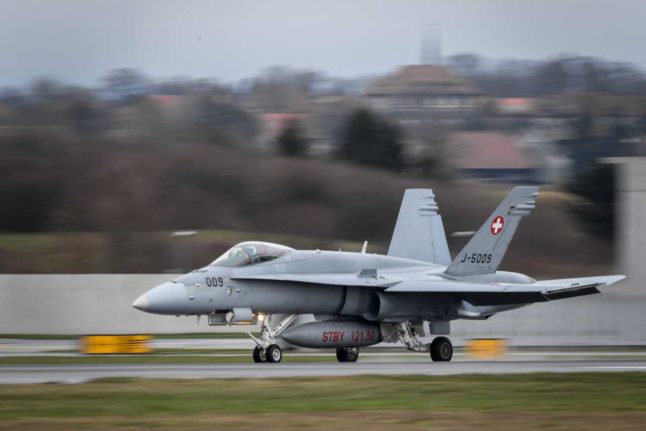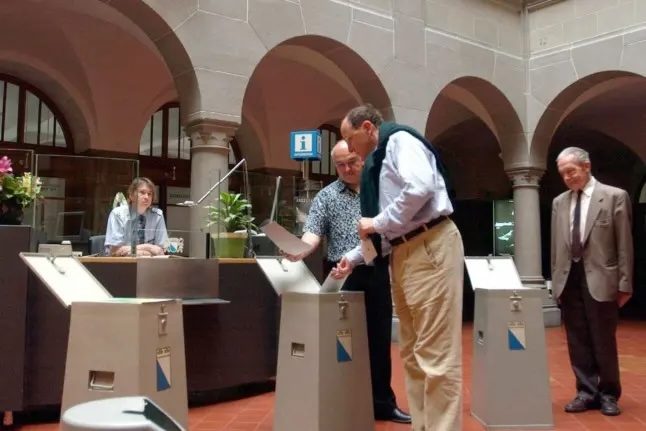Russia’s cynical and devastating war against Ukraine has put Swiss neutrality under intense scrutiny. Though it has always had an elastic quality, the question now is how far Swiss neutrality should be stretched, given the high stakes of the current conflict.
The Swiss government itself refers to Swiss neutrality as a flexible instrument. In an official publication on the subject, issued eight days after Russia invaded Ukraine, this was plainly stated.
“Switzerland has never taken neutrality to be a rigid statute of foreign and security policy … It defines its position on the basis of the specific circumstances of the individual case.”
But this flexibility inevitably leads to clashes of opinion at home, especially because Swiss neutrality is a key aspect of the country’s origins and self-image.
Switzerland is not just neutral, it’s famously neutral. It has also benefited enormously from its special position, as much through war damage averted as from opportunities created.
EXPLAINED: Why is Switzerland always neutral?
There is currently a tug-of-war taking place in Swiss politics about the shape of neutrality. At the more hawkish end of the rope, parliamentarians like Hans-Peter Portmann (FDP) and Beat Flach (Green Liberals) are calling for Switzerland to be able to initiate its own sanctions. This opinion has majority backing in the National Council’s (parliament) foreign affairs commission.
Currently, the country may only adopt UN or EU sanctions, as Switzerland did with EU sanctions against Russia imposed at the end of February. Being proactive on sanctions would be a big change.
The move two months ago was heralded at the time as an historic breach of Swiss neutrality, but given that Switzerland had participated in international sanctions before, the move wasn’t as dramatic as it seemed. As far back as 1920 when Switzerland joined the League of Nations, it was prepared to share in the League’s economic sanctions.
Sanctions on Russia: Is Switzerland still a neutral nation?
Neutrality is clearly in the eye of the beholder. The Swiss People’s Party still aspires to a purist blend of sovereignty and neutrality in which Switzerland would remain aloof from all the (non-financial) dirty business of the world. It opposes, for example, the country’s impending membership of the UN Security Council (2023-24), just as it opposed Switzerland joining the UN in 2002.
At some point, voters will have their say on the definition of neutrality – either through the popular initiative announced by former People’s Party strongman Christoph Blocher, or sooner if the parliament’s template for neutrality is put to a popular vote.
Foreign Minister Ignazio Cassis has promised a report on Swiss neutrality “by the summer”. That document will provide more fuel for the debate.
READ MORE: Switzerland mulls ‘neutrality referendum’ amid Ukraine backlash
This report is likely to reiterate the core principles of Swiss – armed and active – neutrality. The first unchangeable principle is the obligation under international law for a neutral state not to participate in any international armed conflicts.
As an extension of this, Switzerland may not enter into any obligations “that would result in a violation of its neutrality in the event of war”. That means joining a military alliance like NATO is obviously out of the question.
But it doesn’t mean that Switzerland can’t have a working relationship with NATO. Along with other neutral European countries, Switzerland has been a Nato partner since 1996, in the framework of the Partnership for Peace.
Switzerland actively cooperates with the alliance in the promotion of human security, defence institution building and in multinational peace-support operations, such as in Kosovo.
When it comes to regional security, Switzerland is far from being a passive player. Despite not being a member, it participates in the European Union’s civilian and military peace promotion missions in the framework of the EU’s common security and defence policy.
The Alpine country has also been a member state of the Organisation for Security and Co-operation in Europe (OSCE) since 1975. It uses the organisation as a forum to discuss security policy issues and supports OSCE missions such as election observing.
Things are more tricky for the Swiss regarding the sale of arms. Legally, a neutral state may not militarily favour warring parties, whether with troops, armaments, or by making its own territory available.
Being a significant weapons exporter has always sat uneasily with its self-professed neutrality but Switzerland has taken pains only to sell to states not involved in conflict.
That doesn’t mean Swiss weapons and ammunition never end up being used in conflicts, Over the past 20 years, Ukraine and Russia have bought almost CHF6 million worth of Swiss weapons, which are currently being used by both sides against each other.
READ MORE: How Swiss weapons are being used on both sides of the Ukraine-Russia conflict
Despite that reality, Switzerland just prevented Germany from making good on its promise to deliver Gepard anti-aircraft tanks to Ukraine. The Germans wanted to send Swiss-made ammunition with the tanks but the Swiss said no to their re-export request.
Giving Switzerland more flexibility to allow exports to a country like Ukraine, under attack, is another proposal with some support in parliament.
There seems little doubt that some degree of change to Switzerland’s neutrality policy is coming, partly because of the intense focus on the issue, but mainly because the world has changed since Russia’s latest aggression in Europe. And when the world changes, Swiss neutrality adapts.
Switzerland is free to apply different degrees of friendliness and flexibility to its neutrality, depending on its own goals and the other countries involved. The challenge will be to do this without jeopardising its long-standing diplomatic role in good offices.
Despite some nostalgic rhetoric, the Swiss are under no illusion that they can guarantee their defence alone. Ultimately the country’s security is tied to the security of its like-minded partners in the region, with or without neutrality.
OPINION: Criticism of Swiss refugee response lacks perspective



 Please whitelist us to continue reading.
Please whitelist us to continue reading.
Member comments